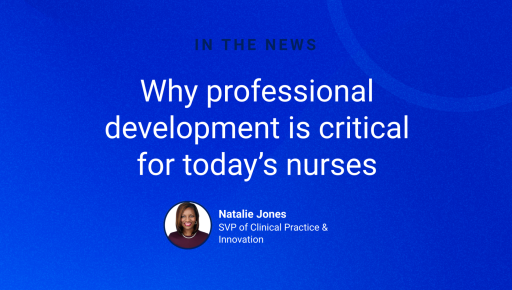If you’re exploring potential career paths in healthcare, chances are you’ve at least thought about going into nursing—and now’s the perfect time to do it. Nursing will stay a high-demand profession for the foreseeable future due to factors like the aging population, the lingering effects of the Covid-19 pandemic, and other health concerns on the horizon.
According to the American Nurses Association, the projected rate for registered nurse employment alone is expected to grow by 9% by 2030.
Despite the high demand for nurses, it is still only sometimes seen as an easy field to enter. Nursing is hard work, requiring a high level of dedication to helping people, excellent communication skills, and the right emotional temperament. On top of this, nursing requires extensive education and a steep learning curve for the clinical knowledge and skills needed to help patients.
It is possible for anyone who truly wants to become a nurse for the right reasons to reach this goal. The following practical guide can give you a clear understanding of what it takes to become a nurse and the wide range of career options available.

Becoming a nurse: qualification and considerations
To contemplate a nursing career, you must first determine if this profession resonates with your calling. There are numerous advantages and disadvantages associated with nursing. It can provide a stable career path and present incredible, fulfilling prospects, but it is certainly not suited for the emotionally delicate. Prior to taking any tangible steps—such as enrolling in a nursing school or seeking financial assistance—ensure that you possess an intense passion to assist others, free from excessively idealized perceptions of the nursing profession.
Pros of being a nurse
Caring for others
One of the main reasons people choose a nursing career is the opportunity to care for others. In some situations, a nurse can mean the difference between life and death for a patient, and many nurses see their job as more of a calling. Certainly, no job offers the same satisfaction for those who wish to help others.
Great pay
Because demand is high, nurses command a good salary. Remember that pay can vary depending on your location and job. In Texas, registered nurses made a median annual salary of $72,890 in May 2018, according to the latest numbers available from the U.S. Bureau of Labor Statistics (BLS).
Strong job growth
According to BLS projections, the number of nurses is expected to grow 12% by 2028. In Texas, that rate is 24.1%, according to Projections Central. An anticipated nursing shortage in Texas has also led to a higher demand for nurses who hold a BSN or MSN in Nursing.
Diverse work environments
Nurses pursue careers in many different settings. These include hospitals, ambulatory care, community centers, outpatient clinics, and long-term care homes. Some also choose to work as travel nurses, taking full-time, short-term jobs at different locations nationwide.
Multiple career paths
Many nurses start by earning a two-year degree before moving on to an RN-to-BSN program. BSN nurses can choose to go further with their education, earning graduate degrees to become pediatric or family nurse practitioners.
Cons of being a nurse
Physically demanding
Nurses often lift patients, bending or crouching down to provide care or use equipment, and are almost always on their feet for the entirety of their shift.
Emotionally draining
Caring for ill or dying patients, as well as interacting with their families who are often distressed and concerned for their loved ones, can take a toll.
Stress
When you are dealing with life-and-death situations, you will experience stress.
Tough work schedules
Shifts are long and often require giving up nights, weekends, and holidays.
Tips for Selecting a Nursing Career
Begin by considering your preferred location and work environment in your nursing career. Would you like to be part of a rural health clinic or a large surgical center? Perhaps you see yourself in case management, or in emergency, critical care or trauma nursing, particularly if you have a strong desire to assist people in critical situations. Alternatively, you might be more suited to home health care. With the increasing number of aging adults choosing to receive medical care at home, this field can offer several benefits to nurses such as:
- Flexible working hours
- Personalized patient care
- Autonomy in the workplace
Finally, finding employment in a healthcare organization that has a positive culture is vital. During your employment interviews, don't forget to inquire about training opportunities, support systems, benefits, and staff turnover rates.
Types of nursing degrees
Before applying to nursing school, an aspiring nurse should firstly contemplate the nursing degree they're interested in. Your educational level in nursing can influence your work environment, specialization, potential for progression, and income. There are various types of nursing degrees to consider.
- Certificate Program: Licensed Practical Nurses (LPN) complete a certification program (less 12 months)
- Associate Degree in Nursing (ADN): ADN typically focuses on guiding nurses toward further education to becoming a registered nurse (RN) (two years)
- Bachelor of Science in Nursing (BSN): The typical first step to becoming a registered nurse (RN) and usually includes a broad education and theory-oriented curriculum (four years)
- Master of Science in Nursing (MSN): Postgraduate nursing programs are designed to train nurses for administrative or management roles, as educators, or advanced practice nurses (two to three years)
When deciding what degree to pursue, consider your previous education, current financial resources, and whether you can attend school full-time. While some nurses decide from the beginning to go all the way through a master’s degree, many more will take incremental steps such as LPN to ADN to BSN.
In some cases, nurses may even choose to test the waters as certified nursing assistants (CNAs) or other roles so they can better understand if nursing is right for them.
Getting into and completing nursing school
While there are many paths to nursing, there are even more schools and programs for which you can earn your target degree or certification. Nursing schools are selective. Work hard in any prerequisite classes you teak and brace yourself for multiple admission attempts.
Take time to learn about the specifics for each, as such admissions requirements and application process. It’s also smart to apply early so you have time to prepare for any admission interviews and figure out your finances.
RN licensing
Obtaining your nursing degree is a significant milestone, but it doesn't mark the end of your journey to become a nurse. Every nurse in practice has to clear a licensure exam. Two distinct types of licensing exams - the NCLEX-PN and NCLEX-RN - are administered by the National Council Licensure Examination (NCLEX). These exams are rigorous and are intended to thoroughly assess the competencies and insights of aspiring nurses. Therefore, the NCLEX should not be taken lightly, even by those who have excelled in their nursing studies..
Embarking on your nursing career
Upon obtaining your diploma and successfully passing your licensing examination, you are now eligible to submit applications and attend interviews for nursing positions! However, don't assume that you will secure your ideal role immediately after graduating from nursing school, despite the high demand for nurses. The competition for these roles remains intense.
Be prepared to start at the entry level with demanding hours, less-than-ideal shafts, challenging patients, and lots to learn right from the start. The first year as a nurse is often the hardest. Putting your time in during your first few years will give you invaluable skills and gain critical hands-on experience that will help you grow and develop as a nurse and as a person.
But building a fulfilling, steady, and rewarding career is worth the work. Work hard, be flexible, have a growth and learning mindset, and remember the people you are there to help, and you’ll be a seasoned nurse in no time.
Work with a nursing career partner
Prolink can help with a selection of top local and travel nursing jobs. A team of dedicated recruiters is here to help you make the next move in your career. Click below to begin your job search.









